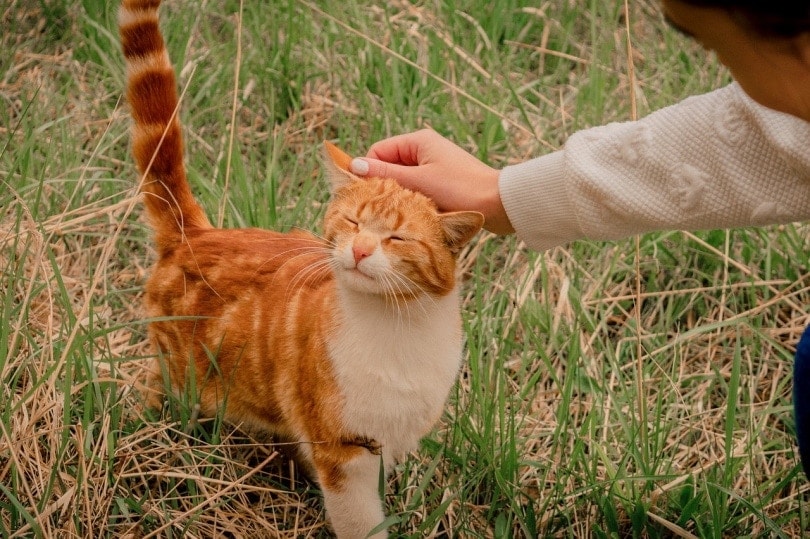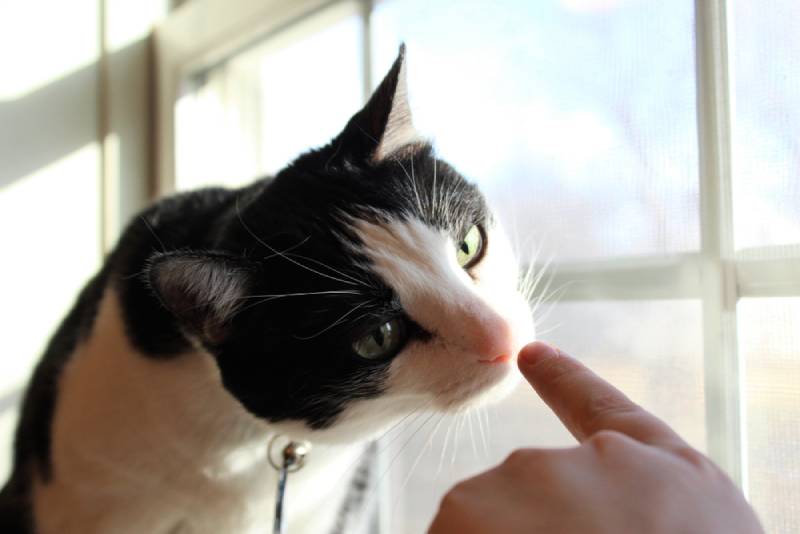Booping a cat is the ultimate way to ask a cat’s permission to give it some love. It generally involves taking one finger, touching your cat’s nose, and then holding it out for a cat to investigate. Most, but not all, cats enjoy a good boop, provided it’s done respectfully and without forced or unwanted contact. Cats interested in interaction often take a sniff and move in for more contact, giving you the green light to boost your petting game.
It’s a great way to introduce yourself to cats you don’t know, but remember not to stare and to hold your hand out until they decide to approach you, as cats generally like to be in the driver’s seat when it comes to interacting with new people. Cats that know and trust people often see boops coming and respond by moving in and holding their heads up in anticipation of some love.
How Do Cats Greet Each Other?
Cats have incredibly sensitive noses, so they usually recognize each other first by smell. The feline sense of smell is about 14 times sharper than the average human’s.1 When cats greet each other, they approach, touch noses, rub heads, and then slide along each other’s bodies, allowing both to pick up the other’s information-laden pheromones while creating a comforting joint scent.
Pheromones are powerful chemicals cats leave behind that contain information about their health and reproductive status. Feline scent glands are located behind their ears, around their whiskers, and between the digits of their paws.
When a cat rubs their head against you, it leaves a bit of its scent behind and picks up a bit of yours, creating a unique scent signature cats associate with comfort and love. And when cats scratch in the wild, they’re marking their territory and leaving pheromones behind that are packed full of important information for other cats.

Do Cats Like Nose Kisses?
Many cats enjoy giving their favorite people nose kisses, and although most felines don’t enjoy wet human kisses on their noses, others are fine with it. But many cats are happier to receive kisses directed towards the top of their heads between their ears.
Do Cats Like to Have Their Noses Rubbed?
While there are always exceptions, most cats don’t enjoy having their noses rubbed. The point of a boop is to provide cats with a way to determine if they’re interested in further interaction. Most cats are likely to become mildly irritated at sustained nose-rubbing activities.
Where Do Cats Like to Be Petted?
Generally, safe places to pet cats include the tops of their heads, backs, and sides. Many enjoy a good chin stroke, and some like to have the area around their shoulders gently scratched. But a great deal depends on the cat and your relationship with them. Cats sometimes allow those they know well to pet and cuddle them but prefer to keep their distance from strangers.
Others are perfectly happy to approach new people and welcome attention and contact. Let the cat’s response to your attention be your guide. If the cat starts purring and leaning in for more, you’re probably doing just fine. However, consider adjusting your approach if the cat walks away or begins to show signs of discomfort or stress.

How Can I Make My Cat More Comfortable Around Strangers?
Cats sometimes take a while to warm up to strangers, but there are things you can do to improve the chances that your pet will eventually make an appearance and be comfortable around visitors. Consider giving your cat a nice safe, high perch to hang out on when you have company.
Elevated Platforms
Put a cat tree and a few cat shelves in the rooms where you most often entertain visitors so your buddy has a place to retreat to where they can feel safe and comfortable enough to investigate the situation further. However, it’s fine if your cat prefers to hang out elsewhere when you have company.
Cat Bed and Toys
Leave toys in the room where you plan to sit with your friends so your cat has something fun to draw them out when they’re ready. Provide your cat with a comfortable bed somewhere in the room where they can sit if they want to be closer to the action. Make sure your visitors know to let your cat do the approaching and how to interact with your buddy when they come out for a look.

Treats and Pheromone Sprays
Have treats on hand to reward your cat when they decide to hang out. Consider letting your visitor put down a few treats for your pet so your cat starts associating yummy things with visitors. Calming pheromone sprays sometimes help calm anxious cats making it easier for them to remain centered around visitors.
Playtime With Your Cat
Before your company arrives, a bit of playtime can release feel-good endorphins, which may lower your cat’s overall stress level and allow them to be more relaxed while your friends visit.
Conclusion
Many, but not all cats, enjoy a good boop, as it gives them a chance to investigate new people in a non-threatening way. It’s a fantastic way to introduce yourself to unfamiliar cats, allowing them to take the lead in interaction. To increase your chances of success, avoid looking directly at the cat and consider crouching down or sitting on the ground so you’re not towering over it.
Familiar cats are often quite happy to be booped. Remember that most cats don’t like having their noses rubbed; the ears, sides, and backs are usually better options. Always let the cat’s response to your attention be your guide.
Featured Image Credit: DCM Images, Shutterstock












